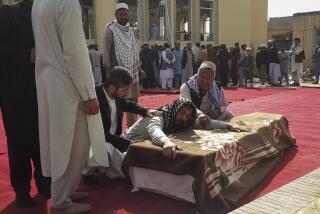U.S. Will Press for Ouster of Najibullah Government
- Share via
WASHINGTON — With the last Soviet troops about to leave Afghanistan, the Bush Administration has decided to press for the replacement of the Soviet-backed Najibullah regime in Kabul as quickly as possible, U.S. officials said Saturday.
President Bush and members of his National Security Council conducted their first full-scale review of Afghan policy Friday and decided to continue providing military supplies to Afghan resistance groups as long as the supplies are required to topple Najibullah, the officials said.
“The (Najibullah) regime is the result of the Soviet intervention in Afghan affairs, and we don’t see our goal as completed until that regime goes as well,” one State Department official said Saturday.
Principal Aim
Bush’s review was prompted by the impending withdrawal of the last Soviet troops from that country, scheduled to take place by Wednesday. That pullout has been the principal aim of Washington’s Afghan policy since the Soviet Union intervened in 1979.
A State Department official said the United States now believes Najibullah and his government will fall within the next six months.
“I think three to six months is really the time period we’re looking at,” he said. “If they don’t fall within three to six months, then we’ve got problems. That is, the resistance groups have problems.”
Since the mid-1980s, Washington’s covert program in support of the Afghan resistance--run by the CIA and the Pentagon--has delivered as much as $600 million a year in military aid to guerrilla groups, by unofficial estimates. Because it’s an ongoing program, Bush will not be required to give approval for a new covert program.
Source of Friction
U.S. officials said that at Friday’s meeting with Bush, the State and Defense departments and the CIA all agreed on the importance of continuing the program, even though such action could create new friction for the Bush Administration with the Soviet Union.
Last spring, the United States offered to stop all military supplies to Afghanistan if the Soviet Union did so. When Moscow refused, Washington announced a policy it called “positive symmetry,” under which the United States would keep sending arms to Afghanistan as long as the Soviet Union did so.
In a shift of direction last December, Soviet President Mikhail S. Gorbachev proposed a cutoff of all outside military aid to Afghanistan, but the Reagan Administration rejected his proposal.
White House spokesman Marlin Fitzwater reiterated Saturday that that policy remains in effect.
“The United States will continue to support the rebels as long as the Soviet Union supports the Kabul government,” he told reporters at Bush’s home in Kennebunkport, Me.
More to Read
Sign up for Essential California
The most important California stories and recommendations in your inbox every morning.
You may occasionally receive promotional content from the Los Angeles Times.













